Prof M Asim Siddiqui delivers talk on Contribution of AMU scholars to Urdu Literature
Aligarh : The Indian Diaspora Washington DC Metro organised a comprehensive online lecture on the topic “Contribution of AMU scholars to Urdu Literature & Criticism: The Role of the Department of English”. The talk, coinciding with Azadi ka Amrit Mahotsav observations was delivered by Prof. Mohammad Asim Siddiqui, Chairperson, Department of English, AMU.
“Today, as we are celebrating Azadi ka Amrit Mahotsav, the discussion about documenting the history of the Department’s contribution to Urdu literature and criticism becomes very relevant”, said Professor Siddiqui beginning his comprehensive survey of the literary scene at AMU, especially at the Department of English. Aware that there is a whole list of important names who directly or indirectly contributed to the promotion of Urdu,”, he began his discussion by talking about Urdu writers and poets and their works since 1947.
He stressed on how the faculty at the Department of English has been at the forefront in producing Urdu poetry, fiction, drama, criticism and translations in English. He mentioned the works and contribution of Prof. Khawaja Manzoor Hussain, Dr. Salamatullah Khan, Prof. Asloob Ahmad Ansari, Professor Masoodul Hasan, Prof. Zahida Zaidi, Prof. Maqbool Hasan Khan, Dr. Amin Ashraf, Professor Mohd Yasin, Prof. S. Wiqar Hussain,Prof. Farhatullah Khan, Prof. Shahnaz Hashmi, Prof. Najma Mahmood, Prof. A. R. Kidwai, Prof. Syed Asim Ali and Prof. Atia Abid.
“There are several factors responsible for the popularity of Urdu translation and criticism today which include the Internet, change in the nature of English Studies and availability of big and small publishers ready to publish translations”, said Prof. Siddiqui. He also touched on some interesting facts during his talk.ThusFaiz Ahmad Faiz sent the first draft of his poem “Ye daghdaghujala ye Shan ghazeedasahr” to Khawaja Manzoor Hussain which he read in many gatherings in Aligarh.
Professor Siddiqui dwelt at length on the contribution of Professor Khwaja Manzoor Hussain, Dr Salamatullah Khan, Professor Asloob Ahmad Ansari and Professor Zahida Zaidi. Khwaja Manzoor Hussain’s seminal contribution of translating Russian playwrights into Urdu and his works on Iqbal and ghazals of Urdu were especially singled out for praise by Prof. Siddiqui.“Dr. Salamatullah Khan’s books titled Hemingway, AmrikiAdab ka MukhtasarJayeza and Majaz’sAlmiyan aur DoosreMazaminare remarkable for their crisp style and rich content”, said Professor Siddiqui. He discussed the wide-ranging scholarship of Professor Asloob Ahmad Ansari’s brought out in his various books on Ghalib, Iqbal, Urdu novels, Urdu ghazals and his memoir and sketches. He expressed the opinion that of all writers and poets produced by the Department, Professor Zahida Zaidi’s work will have a longer life as her plays will enjoy an afterlife through their English translations. He discussed the use of absurdist technique in many of her plays. Professor Siddiqui also touched on the thematic and stylistic concerns of Professor Zaidi in her plays Bahut Door TakRaatHogi, Sahra e Azam, her novel Inqilab ka ek Din and her various collections of poems, reading out her nazms and her definition of poetry.
He also read excerpts and poems from the works of Dr. Salamatullah Khan, Professor Masoodul Hasan, and Professor Najma Mahmood.
Earlier in the welcome address Prof. Nazia Hasan, Department of English, AMU stated that Aligarh has always been a centre and stage of culture and literature.
In his concluding remarks, Dr. Masood Ali Beg dwelt on the literary and cultural context of Aligarh. He also spoke about the contribution of Prof Masood Husain Khan, Professor Khateeb S. Mustafa and Dr Nadir Ali Khan to Deccani Urdu.
In the long question- answer session, attended by more than 125 participants who included well- known scholars such as Professor Emirita Francis Pritchett, Professor Anisur Rahman, Dr. Syed Amir, Ms Qamar Rahman, Ms. Hamida and others, many important issues related to Urdu literature were raised. Professor Imtiaz Hasnain, the Dean, Faculty of Arts, graced the occasion with his presence from beginning to end.

